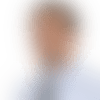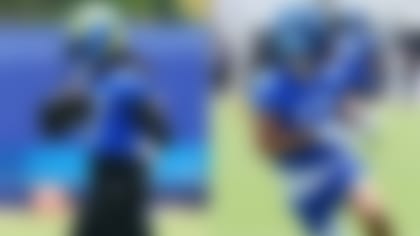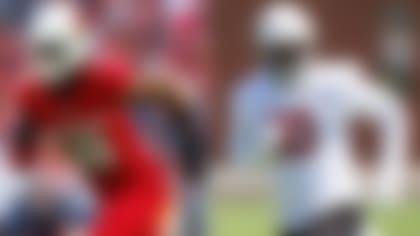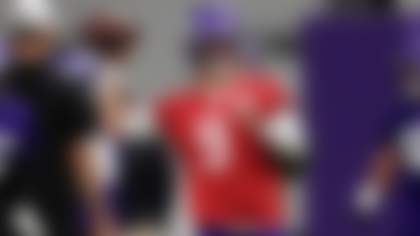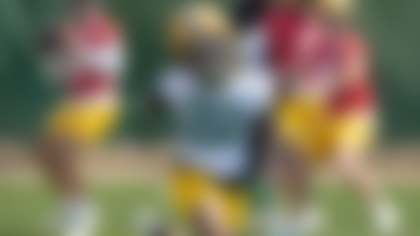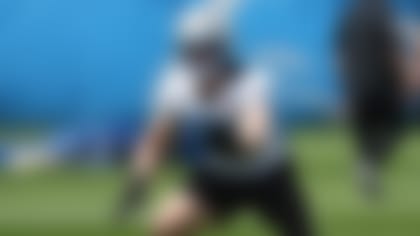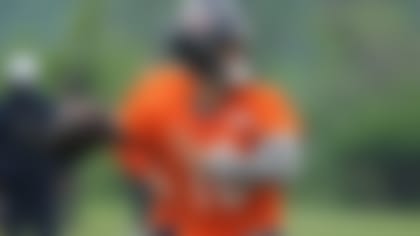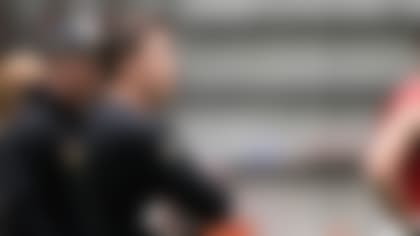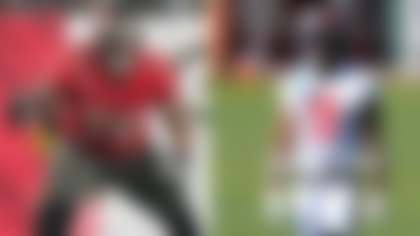With training camps scheduled to begin this month, it's time to get up to speed on all 32 NFL teams. Below, Adam Maya has the lowdown on position battles, strengths, weaknesses and newcomers in the AFC West:

Most important position battle: Running back. A pecking order will need to be set between Phillip Lindsay, Melvin Gordon and Royce Freeman, and their general usage just might fall in that order. But it's exactly how they'll be deployed that is most intriguing. Will the smaller, more explosive Lindsay assume fewer carries but an expanded role in the passing game? Will Gordon be the primary receiving threat out of the backfield or push for a comparable number of totes as Lindsay? Will the 238-pound Freeman be reduced to a short-yardage and/or goal-line function after catching 43 passes last year? The Broncos have depth and versatility, and they have roles to determine with their running backs. It's a good problem to have.
Biggest strength on roster: Pass rush. Denver finished in the middle of the pack in sacks last year with 40. Bank on that number rising in the coming season, perhaps dramatically. Generating pressure on quarterbacks is part of what Vic Fangio does best, and he has the pieces to do it. Von Miller and Bradley Chubb combined for 26.5 sacks in 2018, but that number plummeted to nine last year, thanks in large part to Chubb tearing his ACL in Week 4. Without his pass-rushing partner for the final three months of the season, Miller failed to reach double-digit sacks in a full season for the first time in his career. Chubb is said to be healthy and running full speed this offseason. Adding five-time Pro Bowler Jurrell Casey and re-signing Shelby Harris makes for a dynamic pass-rushing group, and makes it hard for opposing offenses to slide their protections.
Biggest weakness: Quarterback. There's great optimism surrounding Drew Lock after he led the Broncos to four wins in five December starts, having missed most of his rookie campaign with a thumb injury suffered in the preseason. The excitement's totally fair and reasonable, but Lock's small sample size and initial production hardly guarantee greatness. John Elway's troubles to replace Peyton Manning are well-documented and likely augment the hopefulness around Lock. The second-round pick exceeded expectations during his late-season tryout after appearing overmatched in the preseason prior to his injury. The Broncos will need to see at least a full season from the 23-year-old before deciding if he's really their guy. He can take solace for now in not having to look over his shoulder (no offense, Jeff Driskel and Brett Rypien). If Lock's first-year flashes were a sign of things to come, Denver has a roster that can contend for a playoff spot.
Newcomer/player returning from injury to watch: Jerry Jeudy, wide receiver. Had Jeudy been eligible for the 2019 draft, he likely would have gone higher than No. 15 overall and definitely would've been the first receiver off the board. The deepest wideout draft in years meant the Broncos didn't even have to trade up for the 2018 Biletnikoff Award winner, as he fell right into Denver's lap. Jeudy and fellow rookie WR KJ Hamler bring explosiveness to a Denver offense that sorely needed it. Lock couldn't have been happier with those consecutive selections in the first two rounds of April's draft. The addition of Jeudy, in particular, looms large. Not unlike the reinsertion of Chubb to the defense, Jeudy's arrival could have a ripple effect on the rest of the offense.

Most important position battle: Running back. Damien Williams made a statement down the stretch of the Chiefs' Super Bowl run, as he was arguably snubbed for SB LIV MVP honors. Kansas City made a statement in the 2020 NFL Draft, taking LSU RB Clyde Edwards-Helaire with the 32nd overall pick. In fact, CEH was the first back off the board, instantly deemed an ideal fit for Andy Reid's offense. That can't be lost on Williams, even if the seventh-year veteran was only a part-time starter last year. He's averaged a robust 4.7 yards per carry since joining the Chiefs in 2018, while routinely delivering in big moments. But Williams will have to hold off a first-round back seven years his junior to win the feature role he's long worked toward and patiently waited for.
Biggest strength on roster: Quarterback. Back in 2018, Matt Ryan signed a $150 million deal. That stood as the biggest contract in NFL history ... until Patrick Mahomes' mega-extension tripled the amount of new money. It was the result of Mahomes' age, talent and excellence. But is he really three times more valuable than his closest peers? Well, he's already the youngest player ever to boast a league and Super Bowl MVP, and he pulled that off in his first two full seasons. You can make the case that he's never had a bad game. The Super Bowl was about to end that streak ... until he flipped the script with a furious fourth-quarter rally. He's the biggest roster strength in professional sports.
Biggest weakness: Cornerback. It would be inaccurate to deem this a glaring issue. After all, the Chiefs had a superb overall pass defense last season. Their run defense was often the sore spot. They improved on both fronts in the back half of the season, which surely contributed to their three double-digit comebacks in the playoffs. Still, the CB position wasn't exactly star-studded. With limited cap space, chasing the big-ticket cornerbacks in free agency wasn't really an option, but you'd have thought Kansas City would snag a cover man earlier in the draft than Day 3. A corner group headed up by Bashaud Breeland, Charvarius Ward and Rashad Fenton is likely no better than serviceable.
Newcomer/player returning from injury to watch: Clyde Edwards-Helaire, running back. The Chiefs bring back virtually the same roster they won with last year, and Edwards-Helaire was their only draft pick among the top 60. After relatively modest production through his first two years at LSU, he erupted for nearly 1,900 yards from scrimmage last season. NFL Network draft analyst Daniel Jeremiah likened him to Priest Holmes. Reid and Brett Veach see a better Brian Westbrook. Edwards-Helaire approaching the skill of either former All-Pro would make the scariest offense in the league unfair.

Most important position battle: Wide receiver. The Raiders addressed their top priority of the offseason by taking Henry Ruggs III at No. 12 overall in the 2020 draft. In what was widely considered the deepest receiver draft in years, Ruggs was the first wideout selected -- a fitting pick for an organization long known to covet speed and unafraid of boom-or-bust prospects. But Las Vegas really needs him to be good -- and right away. Ruggs must not only beat out Zay Jones and Nelson Agholor for a starting spot but establish himself as a true gamebreaker, something general manager Mike Mayock believes will open up the entire offense.
Biggest strength on roster: Pass catchers. This group has gone from thin to deep in a matter of months. The recent WR acquisitions of Ruggs and Agholor fit in nicely alongside Hunter Renfrow and Tyrell Williams. Meanwhile, the Raiders' tight end room is a healthy mix of athleticism, experience and versatility. Darren Waller's fresh off a breakout season, Jason Witten came aboard in free agency and Foster Moreau just scored five touchdowns as a rookie. Not to mention, running back Josh Jacobs can be a weapon out of the backfield and third-round pick Lynn Bowden Jr. was a do-it-all playmaker at Kentucky. Derek Carr has never had so much to work with.
Biggest weakness: Pass defense. It's anyone's guess what Las Vegas will get from a secondary that includes two rookies, a pair of unproven second-year DBs and a trio of castoffs once drafted in the upper rounds. It probably can't be worse than last year, though, when the Raiders' defense ranked 30th in passing DVOA and recorded just nine interceptions. Damarious Randall has been a bit of a ballhawk in the past, and Prince Amukamara was excellent in man coverage in 2019. If they're both serviceable ... and if Johnathan Abram delivers on his first-round promise ... and if Damon Arnette or Amik Robertson can contribute in Year 1 ... the Raiders will be alright. That's a lot of ifs, though.
Newcomer/player returning from injury to watch: Johnathan Abram, safety. The Raiders' third first-round pick from the 2019 draft had asserted himself as a leader before taking his first snap. That made it even more of a letdown when he tore his rotator cuff and labrum in Week 1 and subsequently missed the rest of the season. Scouting reports were mixed for Abram coming out of college, though he was NFL Network analyst Daniel Jeremiah's top-rated safety in the Class of 2019. With a game predicated on physicality more than playmaking, Abram's presence could set a new tone for what has been a soft Raiders defense.

Most important position battle: Quarterback. Tyrod Taylor vs. Justin Herbert. This job has Herbert's name on it. The only question is how soon he starts. Don't be surprised if takes a while. After striking out in pursuit of Tom Brady, the Chargers didn't chase another veteran QB because they were content with Taylor as a placeholder for whoever would be drafted in the first round (which ended up being Herbert). The veteran's skill set is in line with Anthony Lynn's plan to open up the offense with more quarterback mobility. And so is Herbert's. The rookie is just raw and will need time to learn the system. With a roster otherwise primed to win, it's technically Taylor's job to lose.
Biggest strength on roster: Secondary. There's potential for this to be a special group, as the Chargers might boast an above-average player at every spot in the defensive backfield. Casey Hayward has quietly established himself as one of the most consistent corners in the game -- in fact, Pro Football Focus recently ranked him as the No. 39 overall player entering the 2020 season. Chris Harris Jr. should be reinvigorated coming off a sometimes-rough final season with the Broncos. Can he still be a Pro Bowl corner? His arrival will cut into the slot-corner snaps of Desmond King, an All-Pro in 2018 who struggled in coverage last year. A healthy Derwin James alongside Rayshawn Jenkins, coming off his first year as a full-time starter, could be a very strong safety duo.
Biggest weakness: Quarterback. Sentimentality aside, cutting bait with Philip Rivers made a lot of sense. He's 38 and coming off one of the worst seasons in his storied career. Later this decade, he'll be inducted into the Chargers Hall of Fame, if not earn a bust in Canton. That doesn't mean Los Angeles had to ride with him forever. And yet, the ceiling for how good the team can be at QB this year has been lowered. Taylor is one if the league's best backups, but an underwhelming starter. It's possible that Herbert won't be a better option until 2021. That year and beyond is really why the Chargers moved on from their franchise QB and drafted another one.
Newcomer/player returning from injury to watch: Derwin James, safety. Simply put, he was one of the best safeties in the league as a rookie. This year, he figures to push for the mythical crown of top player at his position after missing 11 games last season with a stress fracture in his foot. The tape shows that James can line up virtually anywhere and make an impact, from rushing the passer to stopping the run to covering various receivers. While many attribute the Chargers' seven-win drop-off from 2018 to the deterioration in Rivers' play, the absence of James was comparably damaging to the defense.
Follow Adam Maya on Twitter@AdamJMaya.
